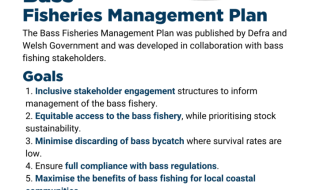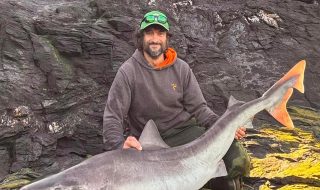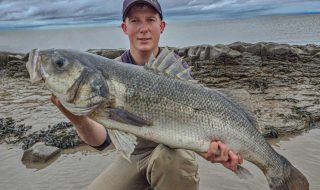The Angling Trust has this week urged anglers to flood MPs’ offices with thousands of letters and emails pressing parliamentarians to raise the bass conservation issues with the Fisheries Ministers in both Westminster and the Welsh Assembly Government. A template letter to MPs has been prepared alongside a new, political Fishing Lines briefing which includes a series of helpful parliamentary questions making the case for action now to save our bass.
The move comes after the publication by Cefas of results from the recent Solent bass survey in the English Channel confirming that there have been five poor year classes in a row (2008 – 2012) which offers a bleak prospect for the future of bass stocks.
The issue was raised directly at last week’s National Angling Summit at Defra with Fisheries Minister George Eustice, who has agreed to look again at the longstanding case for raising the bass minimum landing size (mls). This has now been followed up with a joint letter from the Angling Trust and the Bass Angler’s Sportfishing Society (B.A.S.S.) to the minister challenging the current policy which has appeared, until now, to rely on the EU to implement common measures across the whole North Atlantic fishery rather than taking domestic measures to benefit the inshore waters.
The Fishing Lines briefing to politicians highlights the powerful economic case for recreational sea angling. It says:
“A collapse in bass stocks or a total moratorium on all forms of bass fishing would be disastrous for recreational sea angling which, according to Defra’s own Sea Angling 2012 report shows there are 884,000 sea anglers in England who directly pump £1.23 billion p.a. into the economy and upon which 10,400 full time jobs are dependent. If induced and indirect impacts are taken into account these figures soar to £2.1 billion and 23,600 jobs. The VAT alone which is collected from sea anglers dwarfs the entire value of all commercial fish landings in England. In purely economic terms, we would be better off if bass were retained as a line caught species only with the bulk of the market demand met by farmed fish. This would immediately revive the UK fishery for both the inshore under ten metre commercial fleet, who would be in position to provide a premium product caught in a sustainable way, and the recreational sector – the majority of whom practice catch and release.”
It goes on to stress the need for urgent domestic conservation measures, similar to those already adopted by the Dutch and Irish, irrespective of the outcome of the current EU process which may well end up being watered down by the European parliament.
In their joint letter to the minister, B.A.S.S. and the Trust press the case for raising the bass minimum landing size beyond the lowest spawning length of 42 cms to allow the species to successfully breed.
They wrote:
“It is self evident that allowing the harvesting of a species before it has had an opportunity to breed is completely unsustainable and will lead to serious stock depletion. Why have a bass mls at all that fails to do the job of protecting immature bass?
Raising the minimum legal size for bass from 36cms to 45cms in the UK would achieve the following outcomes:
1. Contribute towards the necessary 80 per cent reduction in catches recommended by ICES which is highly unlikely to be achieved by EU measures alone.
2. Improve the recruitment of bass and protect the year classes upon which a stock recovery will have to be built.
3. Contribute to the UK’s obligation under the reformed Common Fisheries Policy to achieve maximum sustainable yield for all stocks.
4. Reduce the fishing mortality from both recreational and commercial fishing in a fair and even-handed way.
5. Sow the seed for the development and long term increased profitability of the £5m commercial and £200m recreational bass fisheries in the UK.”
Angling Trust Campaign Chief Martin Salter said:
“Successive Fisheries Ministers from both sides of politics have been well aware of the increasingly parlous state of bass numbers and the long overdue need for the introduction of measures to prevent a catastrophic stock collapse. Sadly, it now seems that this collapse could be about to happen. With the exception of Labour’s Ben Bradshaw, who tried unsuccessfully to raise the ridiculously inadequate bass minimum landing size (mls), and the Conservative’s Richard Benyon, who instigated the current mls review, other ministers have been reluctant to either heed the warnings or follow scientific advice. The recent ICES advice for a massive 80% reduction in bass mortality gives George Eustice the perfect opportunity to introduce long overdue conservation measures to save this most popular of sporting fish. The more political pressure we can bring to bear to the less chance there will be of anglers voices being drowned out by the commercial sector’s lobbyists.”
Nigel Horsman of B.A.S.S. added:
“The scientific evidence is alarmingly clear. Urgent and very significant action is needed to prevent a total collapse of bass stocks, of a kind that some other fisheries around the world have struggled to recover from. Bass is our most valuable sea fish due to the very high economic value derived from recreational sea angling and we simply should not have allowed stocks to have been overfished to this extent.”
Angling Trust Marine Campaign Manager David Mitchell said:
“Thankfully recommendations to reduce catches by 80 per cent are not common but unfortunately – due to total unwillingness by the EU and the UK government to act sooner – that’s where we now find ourselves with bass stocks. The situation is bleak and the scientific advice must be followed. It can be achieved but will require two layers of action to achieve what is necessary, one at EU level and one at UK level. Any deviation from this jeopardises the future of the species and bass fishing not just in the UK, but across much of Europe.”






